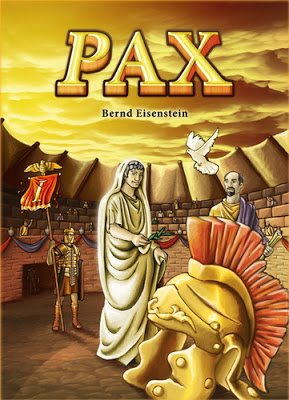Name Pax
Byline A Game of Intrigue During The Ascendancy of Ancient Rome.

Mechanics Card Drafting, Hand Management, Set Collection
Theme Ancient Rome
Publication Iron Games, 2011
Ages 10+
Time 30
Players 1 – 4
Description
In Pax players are the
enemies of Rome. Their goal is to gain
more power than Rome in as many of seven categories as possible. The seven categories of influence cards are:
Land, Intrigue, Religion, Senator, Wealth, Fleet, and Army. Each category yields either abilities or
points for accumulating them.
Additionally, Rome will be accumulating cards in all categories.
The game starts with Rome
receiving three influence cards face-down.
An influence card will then be placed face-up in front of each of the legions
located in the center of the table. The number of legions is represented by one
more than the number of players. Each player starts with five aurei coins and one
influence card. On a player’s turn they
will draw 3 cards: one must go into their hand, one must be placed at one of
the legions, and one must be returned to the bottom of the draw deck. Things get interesting with the drawing of
cards because the player must decide what to do with card 1 before drawing card
2 and likewise, must place card 2 before drawing card 3. After the draw phase the active player can
buy a set of cards from the legions and play cards from their hands on the
table in front of them. Buying cards and
playing down cards both cost money. The
player would then collect income from the bank based on the cards played to the
table in front of them.
receiving three influence cards face-down.
An influence card will then be placed face-up in front of each of the legions
located in the center of the table. The number of legions is represented by one
more than the number of players. Each player starts with five aurei coins and one
influence card. On a player’s turn they
will draw 3 cards: one must go into their hand, one must be placed at one of
the legions, and one must be returned to the bottom of the draw deck. Things get interesting with the drawing of
cards because the player must decide what to do with card 1 before drawing card
2 and likewise, must place card 2 before drawing card 3. After the draw phase the active player can
buy a set of cards from the legions and play cards from their hands on the
table in front of them. Buying cards and
playing down cards both cost money. The
player would then collect income from the bank based on the cards played to the
table in front of them.
Play continues around
the table until each player has taken one turn drawing cards and taking buy/play
actions. At the end of each round the
most valuable set of cards remaining in front of the legions are given to
Rome. Play continues in this manner
until the draw deck is exhausted at which time scoring takes place. Players compare their scores against the
scores of Rome adding in the three face-down cards Rome received at the start
of the game. If Rome wins or ties in
four of the seven categories the player with the most points in the Intrigue
category is declared the winner. If the players have a higher score than Rome
in at least four of the seven categories then the player with the highest score
wins.
the table until each player has taken one turn drawing cards and taking buy/play
actions. At the end of each round the
most valuable set of cards remaining in front of the legions are given to
Rome. Play continues in this manner
until the draw deck is exhausted at which time scoring takes place. Players compare their scores against the
scores of Rome adding in the three face-down cards Rome received at the start
of the game. If Rome wins or ties in
four of the seven categories the player with the most points in the Intrigue
category is declared the winner. If the players have a higher score than Rome
in at least four of the seven categories then the player with the highest score
wins.
Pax is a game where players
have to be aware of the other players strategy. One’s strategy may be try to
win with lots of Intrigue points while helping Rome to victory instead of
working to defeat Rome. Pax
also plays well as a solitaire game.